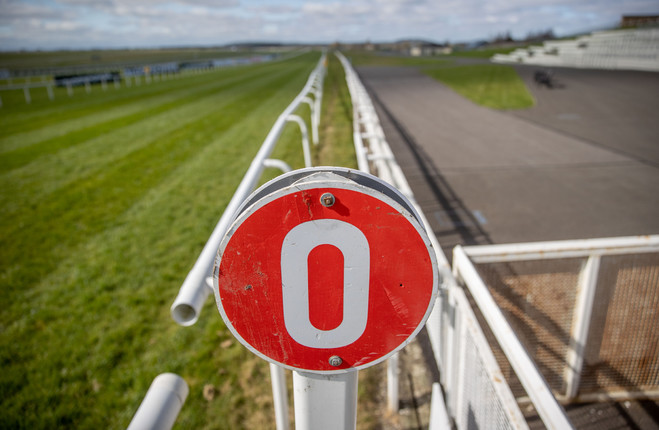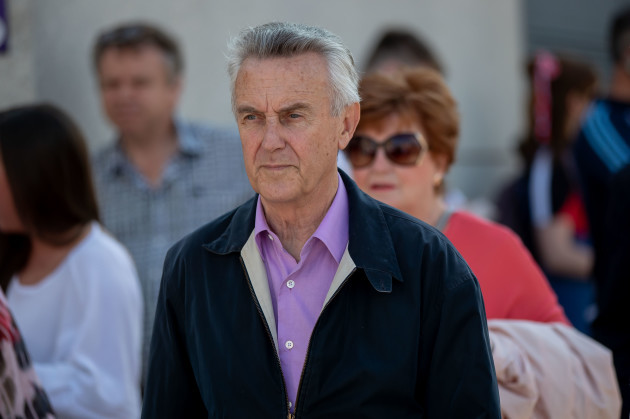YESTERDAY, THE Dáil’s Oireachtas Committee Hearings included one on mental health, housing, climate action and the Good Friday Agreement – but the heavy stuff begins tomorrow when racing comes to town.
This has all the ingredients of being explosive, insipid and somewhere in the middle; the last option long odds-on.
Curiously enough, it is Horse Racing Ireland which will have the least to fret about, at least in terms of questioning, given the clearly dysfunctional tendencies of the Irish Horseracing Regulatory Body and the Irish Racehorse Trainers’ Association.
Before we get to the reason this hearing is taking place, consider recent developments.
On Monday, it was reported that Suzanne Eade would be replacing Brian Kavanagh at Horse Racing Ireland, an in-house appointment that got little enough coverage.
Eade, who prior to joining HRI worked for a number of companies including Boots Ireland and Oral-B, will serve a term of seven years. I have met her a couple of times and she is personable, likeable and also highly regarded, but I cannot say I know much about her in any case or the process of her getting the nod.
Brian Kavanagh’s third term at HRI was ending so he needed to be replaced but Denis Egan’s decision to take early retirement from the IHRB (the artist formerly known as the Turf Club) probably warranted a lot more reaction than it got in the media.
The 60-year-old has spent more than 25 years working for the regulator, with nearly two decades at the helm. He will stand aside from 30 September, calling time earlier than expected for reasons best known to Denis Egan.
The somewhat under-fire boss, who I’ve generally found excellent to deal with and with a genuine concern for jockeys’ welfare, may have just decided he’d had enough, but he is not ducking the Oireachteas meeting, so we will know more about why he decided to depart this year.
Oireachtas hearings are habitually of limited public interest but the exceptions can be earth-shattering, like the Football Association of Ireland’s in 2019. Whilst that was pivotal in the ultimate departure of John Delaney, it is worth recalling that it might have been rather different.
At an interval around half-time on that fateful April afternoon, politicians mingled with journalists and were told firmly that they were performing really badly. Pointed questions were suggested by some media personnel. Delaney wouldn’t field questions (citing legal advice) so others had to, one of them rather memorably hazy on the number of bank accounts the association had.
I understand the TDs grilling HRI, the IHRB and the IRTA have been well-briefed on what might be worth asking, including with regard to the IHRB finances, which relies on public funding.
The IHRB’s board of directors is six-strong, all of them men. However, it is Egan and Dr Lynn Hillyer, its Chief Veterinary Officer/Head of Anti-Doping, who will appear before the committee. This will not be straightforward either for Egan, who has had limited press dealings since Niall Cronin took over as the IHRB’s communications contact, or Hillyer, who tends to avoid giving interviews.
Now let’s consider the Irish Horseracing Trainers’ Association, which will appreciate the contradiction of being hauled unwillingly before a committee because of comments made by Jim Bolger, who is not even a member of the body anymore.
The IRTA is, like everyone in racing, aware that it has rogue members who dope their horses, but that is to be expected in pretty much any walk of life. What nobody knows, even though Bolger seems to think he has a fair idea, is the extent of doping. Attempts by Paul Kimmage, who has endeavoured to find out in the Sunday Independent, have been admirable if speculative.
The main allegation in Sunday’s piece seemingly fell at the first on Monday as racing authorities in Ireland and Britain dismissed claims about a number of horses transferred between both countries showing evidence of steroids.
Kimmage’s piece asserted that an English trainer found three of six horses he acquired in Ireland to have shown evidence of “a number of currently unidentified possible keto-steroids”. In a rather unusual step, both the IRHB and British Horseracing Authority said samples carried out proved the claims were rubbish. Moreover, the IHRB has pleaded with people to call its confidential hotline for months now and nothing has materialised.
Kimmage has implied that the racing media is every bit as servile to the prevailing narrative of omerta as everyone else in the game, which many might agree with.
I spoke to Bolger and Ger Lyons late last year about Bolger’s beliefs. Both have since gone on the record but it should be said that Bolger clearly isn’t doping (unless he’s concealing an even wackier sense of humour than he has) and neither is Lyons, yet both are performing extremely well; Lyons apt to wonder why his strike-rate was so good if others were cheating.
As of May, the IHRB has access to sample any thoroughbred at any time in Ireland, including, crucially, at stud farms. Hair samples can show if steroids were administered at any stage of a horse’s life.
In season three of the Simpsons’ Lisa the Iconoclast, the ever conscientious Lisa discovers that town hero Jebediah Springfield was a fraud. As she takes to the stage in the town celebration, Mayor Quimby about to give the nod to a sniper to take her out, Lisa bottles it and comes to the conclusion that the myth of Jebediah is more valuable than the truth.
In a racing context, a theory reigns that if a major yard were found to be cheating, it might be better off to suppress the information for the sake of the reputation of the sport. Again, like so much we have read and heard on the matter, this is at this stage nothing more than idle speculation, and pretty dangerous at that.
I feel a bit like Jim Sheridan after years looking into who killed Sophie Tuscan du Plantier: more confused than ever. Perhaps I should know more, perhaps I should be more cynical. What I am convinced of is that, when a horse is found to be drugged, the IHRB has been far too willing and happy, in my view, to accept the explanations of the in-dock trainer.
Tipperary TD Jackie Cahill (Fianna Fáil) will chair proceedings and told The42: “We have the opportunity to see if everything is done to the highest possible standards and to see that there is no possibility of drug use going undetected. That’s what I would like to achieve.
“I was (taken aback by the allegations). Jim has made them on a number of occasions. He had the opportunity to come in but he declined on legal advice. That is his privilege.
“There’s a quotation about a Lance Armstrong in Irish racing. That does reputational damage. We’ll be doing our best to find out… we give the various bodies their opportunities to explain. I’m not in a position to form an opinion.
“We are top of the tree as regards horse-racing for a small country. We’ve started to monopolise Cheltenham. We perform far above our weight. I enjoy my day’s racing, I enjoy the sport, but as an Oireachtas Committee, we owe it to the public to make sure this industry is above reproach. We’ll have sessions Thursday and Tuesday to see how the business is run.”
One thing that Bolger has done is get pretty much everybody ruminating over drugs in racing. They do exist and, if it is widespread, a hell of a lot of people have been concealing a whopper of a secret in a sport that employs, give or take, 20,000 in Ireland alone. When it’s never been harder to keep a secret.
Over to you in Dáil Éireann.


